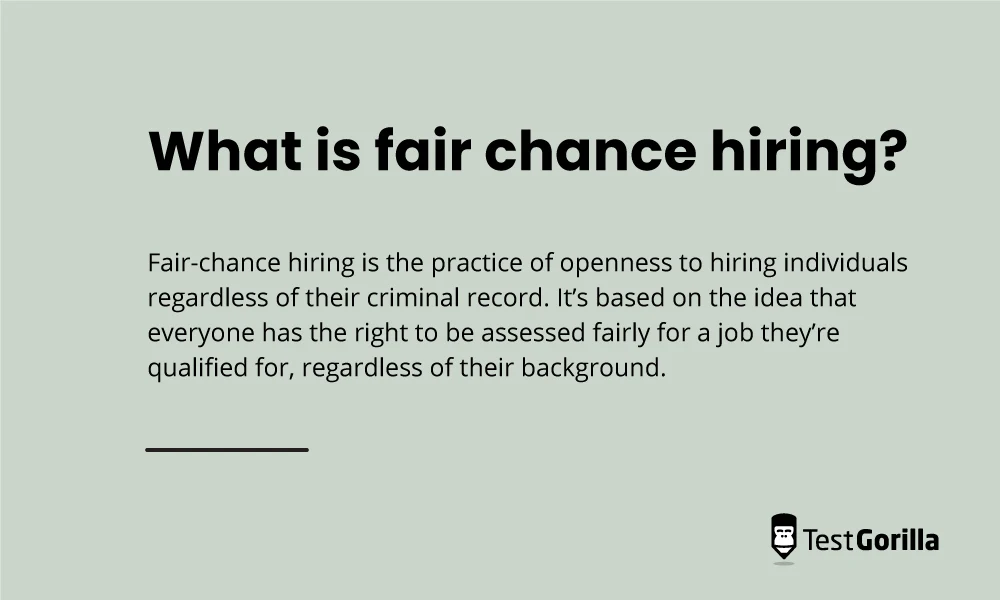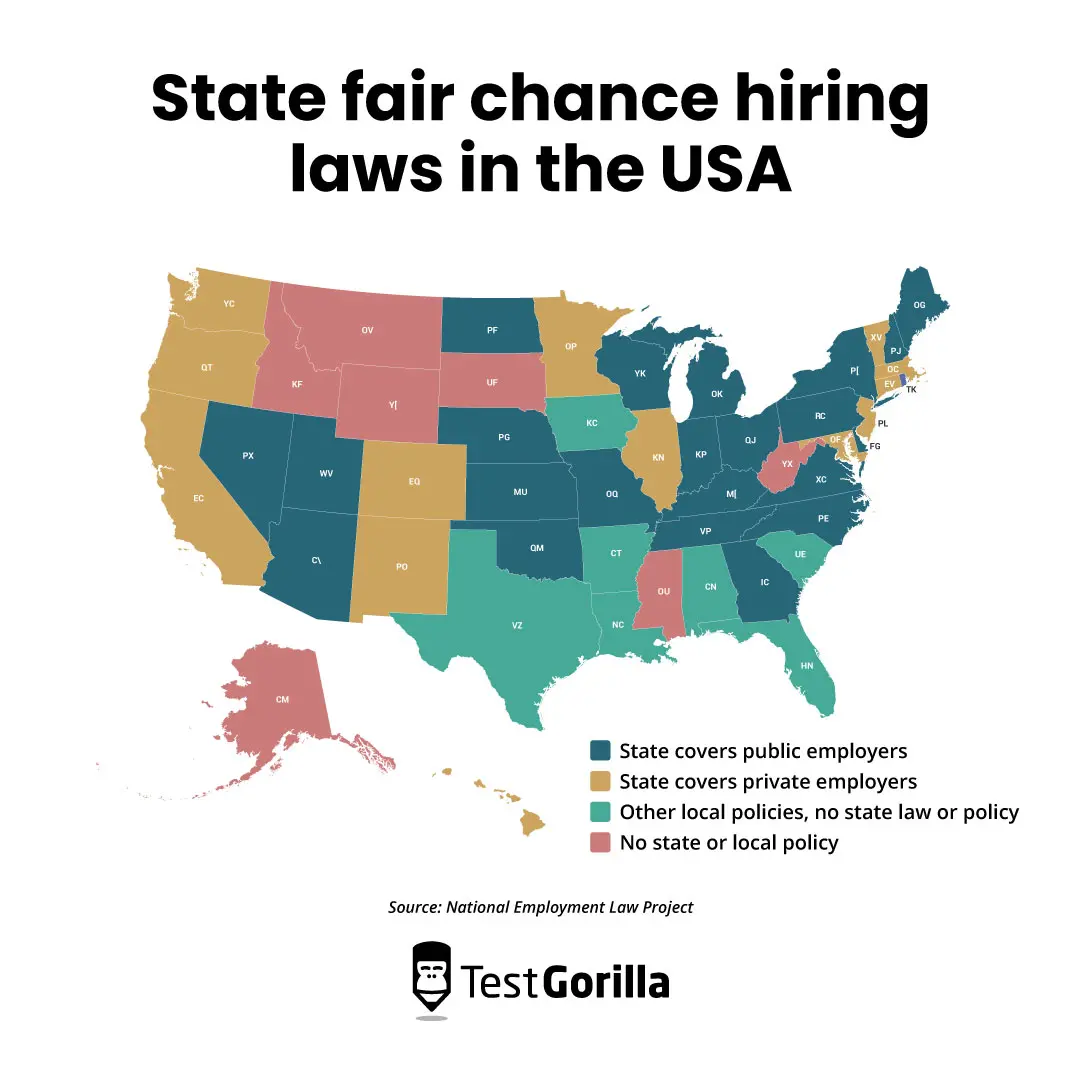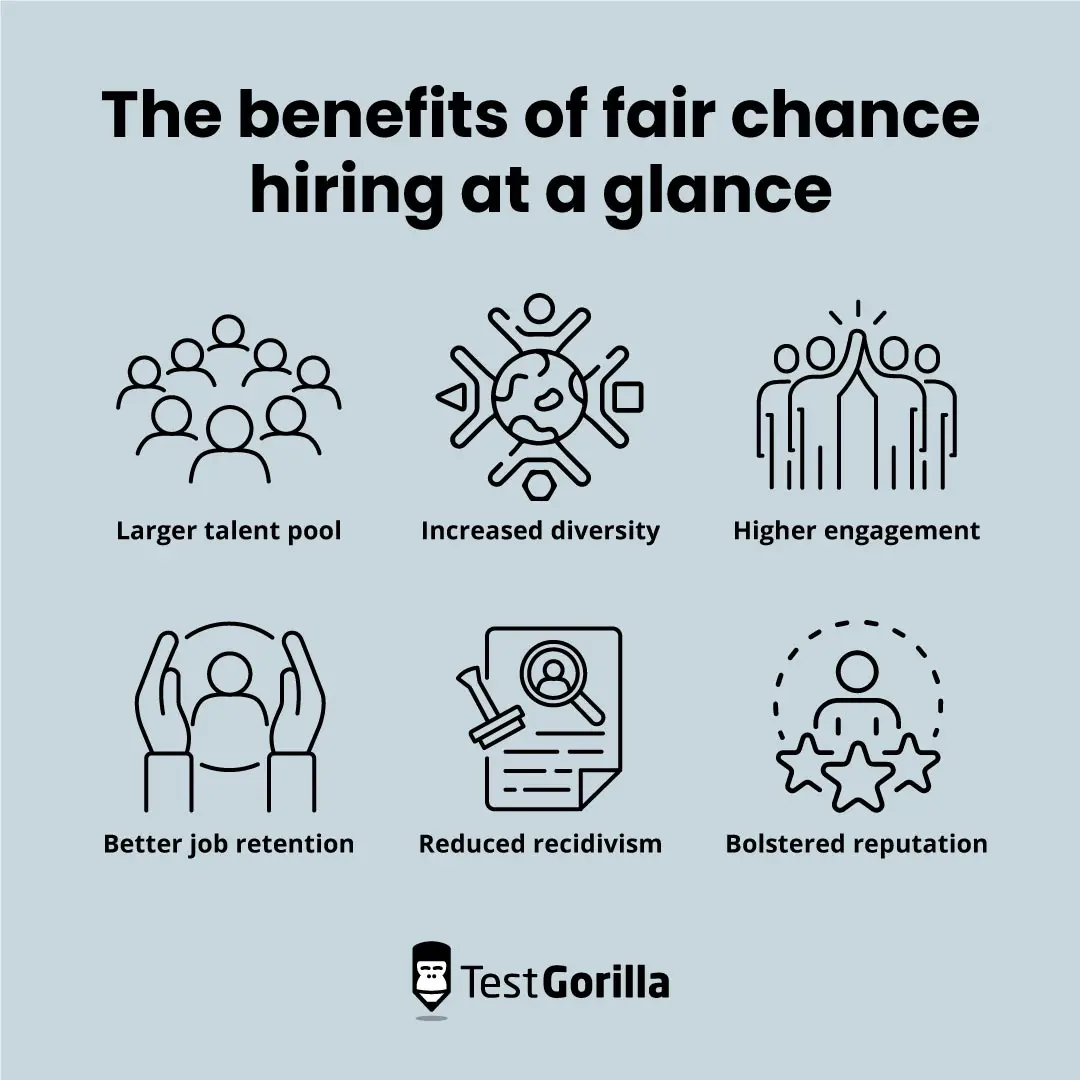Between 70 million and 100 million Americans have a criminal record.[1]
That includes minor offenses. But regardless of how severe the crimes were, many employers don’t offer these workers a fair chance at employment.
Excluding individuals based solely on their criminal record, even when they could pass the necessary skills tests, doesn’t just deny them an opportunity to re-enter the workforce and society.
It also affects the size of your business’s available talent pool and has implications for diversity, equity, and inclusion.
That’s why, increasingly, countries and states are making fair chance hiring a law instead of a recommendation.
But whether or not your area has fair chance hiring laws in place, it’s a great consideration for broadening your company’s pool of potential talent.
This article offers a complete guide to fair chance hiring practices, including legal requirements, benefits, and best practices for implementing them in your workplace.
Table of contents
- What is fair chance hiring?
- What are fair chance hiring practices?
- Fair chance hiring laws
- What are the benefits of fair chance hiring practices for employers?
- 9 best practices for implementing fair chance hiring and becoming a fair chance employer
- Bring fair chance hiring to your workplace by hiring for skills
What is fair chance hiring?
Fair-chance hiring is the practice of openness to hiring individuals regardless of their criminal record. It’s based on the idea that everyone has the right to be assessed fairly for a job they’re qualified for, regardless of their background.
That may seem like a self-evident principle of diversity and inclusion, but there’s one group of people that many employers still feel comfortable discriminating against – workers with some form of criminal history in their past.
That’s because employers often unjustly believe these workers could reoffend at work. They may also fear that they’ll be unreliable or that they don’t have the skills to succeed.
In practice, though, fair chance workers (staff with criminal records) tend to be thankful for a chance to work. They’re keen to prove themselves and learn new skills.
And often, failing to give these candidates a fair chance fosters racial discrimination during hiring. Non-White Americans are disproportionately subjected to arrest and incarceration:
Black and Indigenous people are arrested at twice the rate of White people in the USA
Black Americans are incarcerated at more than 5 times the rate of White Americans
Black Americans are incarcerated at 6 times the rate of White Americans based on equivalent drug charges
These statistics reflect the racial biases at work in the US justice system.
Fair chance hiring has gained more traction in the US recently due to a few key factors:
The US’s staggering incarceration rate, which is higher than that of any other country
Growing public awareness of racial and carceral injustice
The Great Resignation and an increase in competition for top talent
But what does it look like in practice?
What are fair chance hiring practices?
Fair chance hiring practices are the initiatives used to enact fair chance hiring.
They’re intended to prevent discrimination, conscious or otherwise, against candidates with criminal records.
Some examples of fair chance hiring practices include:
Delaying questions about an applicant’s criminal history until they have been made a conditional offer of employment
Removing questions or checkboxes relating to criminal history from application forms – hence the campaign to “ban the box”[2]
Considering all information related to arrests without conviction
Fair chance hiring laws
As we mentioned, fair chance hiring laws are becoming more prevalent – both in the US and around the world.
Here’s a guide to the most significant fair chance hiring laws in effect today.
Federal fair chance hiring laws in the USA
Two laws govern fair chance hiring at the federal level in the USA: the Fair Chance to Compete for Jobs Act of 2019 (also known as the Fair Chance Act) and Title VII of the Civil Rights Act of 1964.
The Fair Chance Act
Under this Fair Chance Hiring Act, federal agencies and contractors cannot ask job applicants to disclose their criminal history before making a conditional offer of employment.
It’s important to note that this law only applies to federal employers. Private companies aren’t affected by the provisions of the act.
Title VII of the Civil Rights Act
Most employers are aware of Title VII because it’s the part of the Civil Rights Act that relates to hiring discrimination.
Under Title VII, employers cannot discriminate against candidates based on race, color, religion, sex, or national orientation.
But it doesn’t specifically protect candidates from discrimination based on their carceral history, and we know that racialized Americans are disproportionately subject to arrest.
There’s a risk that employers could use that lack of protection for former convicts as an excuse to get around Title VII and refuse to hire non-White candidates with the expectation that they would have criminal histories.
State fair chance hiring laws in the USA
Although the specifics vary, 37 US states have written a fair chance hiring initiative into law.
We can’t fit all of them into this guide, but read on for an overview of some landmark state laws.
California Fair Chance Act
California’s Fair Chance Act went into effect on January 1, 2018. It stipulates that employers with five or more employees can’t ask candidates about their conviction history before extending a job offer.
It also prohibits employers from considering the following information about candidates’ criminal histories:
Arrests that were not followed by convictions
Participation in pre- or post-trial diversion programs, where the underlying charges or convictions have been dismissed, sealed, or eradicated
Convictions that have been sealed, dismissed, eradicated, or expunged
Illinois Senate Bill 1480
Senate Bill 1480 was signed into law in Illinois in 2021. It expanded the state’s Human Rights Act by prohibiting employers from discriminating against candidates based on criminal history.
It means that employers can’t make an adverse hiring decision based on a criminal conviction without determining that the conviction is relevant to the duties of the role – or that hiring the applicant would put public safety at risk.
Employers are also obliged to complete a reporting process when declining to offer a candidate a job due to a criminal conviction.
Louisiana House Bill 707
Louisiana’s House Bill 707 became law in August 2021.[3]
Like Illinois’s Senate Bill 1480, it requires that employers assess whether a candidate’s criminal conviction history is relevant to the job before deciding whether to deny them employment – it applies to both public and private employers within the state.
Fair chance hiring laws across the world
Because the US’s prison population is staggeringly high relative to other countries, fair chance hiring is a less relevant topic elsewhere. With far fewer ex-convicts, the question rarely comes up at all.
But that doesn’t mean other countries have overlooked fair chance hiring altogether.
Let’s look at fair chance hiring in other countries.
UK
The UK doesn’t have any specific fair chance hiring laws. However, the UK government encourages employers to adopt fair chance hiring practices as a way to fill skill gaps.[4]
Its New Futures Network initiatives put businesses in touch with prisons to offer offenders employment opportunities on their release.
The European Union
There are no EU-wide laws governing fair chance hiring. However, some EU nations have their own laws in place:
In Germany, which has highly strict data protection laws, employers need a candidate’s informed consent to conduct a criminal background check[5]
In Belgium, criminal background checks must only take into account convictions which are relevant to the role[6]
In France, employers can only collect information on criminal convictions if it is relevant to the position they are hiring for[7]
Australia
In Australia, Tasmania and the Northern Territory prohibit hiring discrimination on the basis of a candidate’s criminal record as long as that record is irrelevant to the role.[8]
Although a petition promoting their version of the US Ban the Box laws reached Australia’s Parliament in 2021, it didn’t gain any legal traction.
Japan
In practice, that means employers can’t access candidates’ criminal records directly. Some companies may ask candidates to provide a copy of their own criminal record instead.
However, there are no specific laws promoting fair chance hiring in Japan.
What are the benefits of fair chance hiring practices for employers?
Fair-chance hiring benefits employers and job seekers alike.
It isn’t just the right thing to do; it has both short-term and long-term benefits for companies, including increased productivity, diversity, and retention.
Let’s take a look.
The benefits of fair chance hiring at a glance
Benefit | How it works |
Larger talent pool | Opening up to candidates with criminal records increases the likelihood of hiring the most qualified candidate for the job |
Increased diversity | Fair chance hiring helps groups that are disproportionately targeted by the criminal justice system |
Higher engagement | Employees are more engaged in a workplace that takes a stand on important social issues |
Better job retention | Fair chance hires are more thankful for their positions and are less likely to leave your company |
Reduced recidivism | Giving a fair chance at employment makes a meaningful difference to the lives of workers from a particularly underserved background |
Bolstered reputation | Fair chance initiatives give credibility to your socially conscious employer brand and attract candidates who share your values |
Larger talent pool
If 70 million Americans have a criminal record, how much talent do you think you’re missing out on by not hiring them?
When you exclude formerly incarcerated individuals, you take a lot of possibilities off the table. Your company could be missing out on a qualified talent pool that draws from a wide range of experiences and backgrounds.
According to a survey conducted by the Price Center, 82% of companies believe viable talent is overlooked due to criminal records, and 74% agreed that fair-chance policies increase the pool of qualified candidates.[10]
If you ignore biases like criminal records and focus only on knowledge and skills, you choose a candidate based solely on talent – and you’re more likely to hire the best.
Increased diversity
As we’ve seen, blanket policies that disqualify candidates with criminal records are a diversity and race equality issue.
Diversity has been an asset to Dave’s Killer Bread since adopting fair-chance hiring.[11]
The company began this practice because Dave Dahl, the founder, had spent 15 years in prison.
Its “second chance” hiring policy made its workforce more diverse. It opened the doors to incredible talent, and not just the individuals with records.
It also attracted diverse candidates who had never had a brush with the legal system due to the company’s inclusive stance. In addition, it improved the company’s reputation (but more on that later).
Rejecting individuals with a criminal history not only unfairly denies job opportunities to people of color, who are disproportionately subject to carceral injustice; it also shrinks your company’s talent pool and diminishes the odds of finding the best candidate.
Higher engagement
According to the 2021 Employee Engagement & Retention Report, 49% of employees claimed they would be more engaged if their employer took a stand on racial and social injustice issues.[12]
And the ability to find work after incarceration is a social issue that particularly impacts people of color.
On that basis, fair chance hiring could boost your employees’ engagement with their roles.
Fair chance hiring also encourages performance. When surveyed, 85% of HR executives and 81% of business leaders agreed that individuals with criminal records perform as well as or better than other employees.[13]
JBM Packaging, an Ohio manufacturing company, updated its hiring process to be more inclusive to people with criminal records and saw this happen first-hand.
In less than two years, one fair chance employee advanced from an entry-level role to a talent acquisition and training specialist.[14]
Hire for performance, productivity, and skill by using unbiased tools like job simulations.
These help you focus on how an applicant will accomplish daily tasks instead of their past.
Better job retention
Businesses that implement fair chance hiring practices see increased job retention and reduced employee turnover.
Johns Hopkins Medicine has been hiring workers with criminal backgrounds since 2000. In 2017, it reported that roughly 20% of its entry-level hires over the past decade had come from a background of incarceration.[15]
Over time, it found that its fair chance employees had a 43% higher retention rate than those without a criminal record.[16]
Some employees may be tempted to move on by a new opportunity. But when given the chance to work hard, re-enter society, and support themselves and their loved ones, fair chance employees don’t take it for granted.
Reduced recidivism
Fair chance hiring reduces recidivism – the chance that a person with a criminal history will re-offend.
Nearly 50% of all released inmates end up back in prison within 3 years.[17] They struggle to re-enter society without a stable job, and they give up hope.
But fair chance hiring initiatives, like Slack’s Next Chapter project, offer formerly incarcerated workers hope and stability.
The project creates tech employment opportunities for workers with criminal records. Each “apprentice” is given support through education, community, and re-entry services.
The project is now partnering with 14 different companies to find work for its apprentices.[18]
Fair chance hiring practices are the ideal cornerstone of any company’s corporate social justice policy. They make material differences in people’s lives and show people that your company has a conscience.
Bolstered reputation
Corporate social justice initiatives like fair chance hiring offer a boost to your company’s reputation.
Reputation is a key part of any business’s employer brand. It’s a way to reflect your company’s values and attract candidates who share them.
Remember Dave’s Killer Bread? The firm’s move toward fair chance hiring practices had the additional benefit of attracting talented, socially conscious candidates who had never been in trouble with the law.
Those candidates were drawn to the company because of its commitment to the values they shared. This is especially common among younger candidates, who want their employers to be socially conscious.
Fair chance hiring broadens your talent pool in more ways than one, making it a highly versatile talent acquisition strategy.
9 best practices for implementing fair chance hiring and becoming a fair chance employer
Fair chance employers are companies that are fully committed to fair chance hiring, giving candidates with criminal records an equitable chance of finding work.
If that sounds like you – or if it sounds like something you’d like your business to be – then you’ve come to the right place. Read on to learn how to implement fair chance hiring effectively in your workplace.
Fair chance hiring best practices at a glance
Best practice | How it helps |
1. Ensure your company’s leaders are invested | Policy changes are driven from the top for maximum impact |
2. Raise fair chance hiring awareness | Training HR staff and hiring managers help them acknowledge and reject their own unconscious biases when recruiting |
3. Say goodbye to resumes | Leaving biased hiring practices behind helps you focus on attributes that matter to the job |
4. Adopt skills-based hiring practices | Encouraging data-driven, bias-free hiring ensures the best candidates are chosen based on ability over pedigree, regardless of criminal record |
5. Be inclusive in your marketing and employer brand | Showing candidates that they have a fair chance of success with your company helps build a larger talent pool |
6. Look for talent via non-traditional channels | Candidates who stand to benefit from fair chance hiring are put in touch with your company |
7. Pick an employee background check tool that supports fair chance hiring | Making sure the employee’s information is accurate is more important than judging their criminal history |
8. Evaluate each candidate’s record using the three “Green Factors” | Fair chance candidates should be judged on suitability for their role on a case-by-case basis |
9. Support your fair chance talent as employees | Treating all your employees equally improves retention and builds a positive employer brand |
1. Ensure your company’s leaders are invested
Your company’s executives and leaders are crucial to successfully implementing fair chance hiring.
Convincing executives that these practices are worthwhile means they get better results once put into place because inclusive leaders are driving them from the top down.
CleanTurn, a commercial cleaning company, uses fair chance hiring practices thanks to the leadership of John Rush, its CEO. In fact, Rush founded the company with the aim of helping formerly incarcerated people get back on their feet.[19]
Rush’s lived experience of poverty and addiction informs the company’s mission, which shows how valuable it can be for leaders to learn about the populations they want to help.
Encourage your firm’s leaders to educate themselves and understand the impact that fair chance hiring policies can have.
2. Raise fair chance hiring awareness
Once your leaders are invested, it’s time to make sure the rest of your company understands the value of fair chance hiring.
It’s especially important that your HR and hiring teams are invested in fair chance hiring. They’re the people who drive your hiring processes; if they aren’t committed to the principle, it won’t happen.
Invest in learning and development opportunities to raise awareness among your staff. Ensure that training sessions have support from leadership so it’s clear that fair chance hiring is company policy.
We know that implicit bias training doesn’t work in the way it’s usually applied. Instead, use it as a way to increase awareness of unconscious biases around criminal records.
Follow it up consistently, and use it as the basis for behavioral change when hiring to increase your chances of implementing fair chance hiring successfully.
3. Say goodbye to resumes
Most recruiters have at least one resume horror story, and there are good reasons for that. Because resumes are self-reported, they’re often unreliable or misleading, which makes them a poor predictor of performance.
Worse still, they lead to biased hiring, whether on the basis of a candidate’s race, educational background, or work history.
Candidates with criminal records lack other candidates’ advantages in these areas. Their resumes also tend to show gaps between jobs – a red flag for hiring managers who don’t know better.
When you stop relying on resumes, you give everyone a fairer chance.
Inversely, when you hire based on skills and abilities, you ignore candidates’ formal credentials (or lack thereof), work histories, and legal pasts – all factors that shouldn’t form part of the hiring process in the first place.
4. Adopt skills-based hiring practices
Skills-based hiring is an alternative to resume recruiting that prioritizes a candidate’s skills and abilities over their experience or pedigree.
From talent assessment tests to structured interviews, these approaches are data-driven and less prone to bias than other approaches.
Here’s how to put together talent assessments for your open roles using TestGorilla:
Create an ideal candidate profile focused on the skills your new hire will need
Set up a new assessment for your role
Choose whether you want to use an assessment template or start from scratch
Select the skills you want to assess based on your ideal candidate profile
Add any custom questions and select any reasonable accommodations
Send out the test link to candidates
We advise against asking candidates for information about their criminal records, so you can be confident that you’re assessing them solely based on ability.
5. Be inclusive in your marketing and employer brand
Hiring on a fair chance basis is one thing, but if you don’t let candidates know you’re doing it, the people who stand to benefit might not apply.
They could feel alienated by a lack of inclusive language in your corporate identity and marketing, or they may just not know that they have an equitable chance of being hired.
Take the following steps to make sure candidates know you’re a fair chance employer:
Use inclusive language in job postings
Include an equal opportunity statement when advertising roles, specifying that you’re a fair chance employer
Promote inclusivity and fair chance hiring as part of your employer brand
Inclusivity doesn’t just attract the type of candidate you’re trying to include. It also catches the attention of candidates who share your inclusive values and believe in your mission.
It’s a way to broaden your talent pool and increase your chances of hiring the best.
6. Look for talent via non-traditional channels
Non-traditional approaches to hiring are great. But to make them as effective as possible, you need to pair them with non-traditional approaches to talent sourcing.
That’s especially important with fair chance hiring, which benefits a demographic that might not have access to traditional job searching channels.
For example, if you’re hiring candidates straight out of prison, remember that they won’t be able to browse LinkedIn to find your job postings.
Newly released candidates might not have much time to job search as they readjust to the outside world. Candidates who have spent a long time in prison are also likely to be behind on today’s technology.
Partner with organizations that work with incarcerated or recently incarcerated people. The Next Chapter Project, for example, works with organizations like Persevere to recruit apprentices.[20]
These organizations put justice-impacted candidates into contact with fair chance employers, making your talent search simpler.
7. Pick an employee background check tool that supports fair chance hiring
It’s possible to practice fair chance hiring while still using background checks. When you need to verify a candidate’s identity or credentials, a background check is often necessary.
Remember, the point of fair chance hiring is not that you don’t know about candidates’ criminal records – it’s that you don’t let them affect your hiring decisions unduly.
With the right background check tool, you can:
Verify a candidate’s identity
Ensure their criminal record is accurate, without implications for the job on offer
Check their work history
Verify any required licenses or credentials, such as a medical license or teaching qualification
An inaccurate background check tool could lead you to make a mis-hire based on bad information or deny a qualified candidate a job they deserve.
But quality tools provide quality data, enabling you to make informed hiring decisions.
To learn more, check out our guide to using recruitment tools.
8. Evaluate each candidate’s record using the three “Green Factors”
Fair chance hiring is all about ensuring everyone has an equitable chance to prove they’re right for an open role.
But there are some roles where a candidate’s criminal record, once you know about it, might make them unsuitable for the job.
Make an individualized assessment of each candidate’s record using the three “Green factors.” [21]
These are:
The nature and gravity of the offense
The time that has passed since the offense (or since completion of the sentence)
The nature of the job the candidate is applying for
This approach ensures that candidates with criminal records are not made subject to a blanket policy that could exclude suitable candidates.
Read these examples to understand how to apply this test.
The IT Manager
Darius has a conditional offer of employment as an IT manager. He discloses to the hiring manager that he has a DUI on his record from 10 years ago.
The hiring manager considers the Green factors:
Although a DUI represents a momentary lapse in judgment, it was not a decision with malicious or destructive intent
The offense took place ten years ago, and Darius hasn’t reoffended since
The criminal conduct involved in a DUI has no relation to the responsibilities of an IT manager role
On that basis, Darius’s criminal record doesn’t result in an adverse hiring decision.
The Care Assistant
Jiyoung has been offered a job as a care assistant at a nursing home. The pre-employment background check reveals that she was arrested one year ago for assault.
The hiring manager evaluates her case based on the Green factors:
Jiyoung attacked and injured another person intentionally
The offense took place just a year ago and was not her first offense
Working in a nursing home would give Jiyoung caregiving responsibilities for members of a vulnerable population
The manager decides not to hire Jiyoung for this specific position because it could put residents of the nursing home at risk of violence.
9. Support your fair chance talent as employees
If you don’t provide your fair chance talent with adequate support as employees, you risk being unable to retain them in the long term.
Make sure your company culture is welcoming and inclusive. Train all your employees to use appropriate language so your fair chance employees aren’t subject to microaggressions.
Remember that these candidates particularly benefit from opportunities to learn new skills and develop professionally. Consider upskilling and reskilling initiatives to ensure they have the capabilities they need.
Don’t forget to provide for employee wellness, too. Non-traditional benefits like mental health support and financial planning help can make all the difference to newly released workers as they manage their transition out of prison.
The support you offer to your staff is what sets you apart as an employer. Don’t neglect it.
Bring fair chance hiring to your workplace by hiring for skills
Fair chance hiring is more than just a way to broaden your talent pool.
It’s a way to make a meaningful difference in people’s lives. It reduces recidivism, adds to your company culture through workplace diversity, and gives formerly incarcerated workers the much-needed benefit of a second chance.
Whether or not fair chance hiring practices are legally required in your area, their benefits are hard to ignore.
To keep learning about fair hiring practices, untapped talent, and unbiased testing – and proudly call yourself a fair-chance employer – read our blogs on special accommodations during skills tests and unfair hiring.
In addition, if you want to incorporate our bias-free tests into your fair chance hiring processes, get in touch with TestGorilla today for a free 30-minute demo.
Sources
1. “Americans with Criminal Records”. The Sentencing Project. Accessed August 21, 2023. https://www.sentencingproject.org/wp-content/uploads/2015/11/Americans-with-Criminal-Records-Poverty-and-Opportunity-Profile.pdf
2. “Take the Fair Chance Pledge”. Ban the Box. Accessed August 21, 2023. https://bantheboxcampaign.org/
3. “ACT No. 406”. Louisiana State Legislature. Accessed August 21, 2023. https://www.legis.la.gov/legis/ViewDocument.aspx
4. “Employing prisoners and ex-offenders”. (March 8, 2023). Ministry of Justice. Accessed August 21, 2023. https://www.gov.uk/government/publications/unlock-opportunity-employer-information-pack-and-case-studies/employing-prisoners-and-ex-offenders
5. “Employment Law Overview Germany”. (August 2, 2023). L&E Global. Accessed August 21, 2023. https://leglobal.law/countries/germany/employment-law/employment-law-overview-germany/01-hiring-practices/
6. “Recruiting Top Talent in Belgium”. Bradford Jacobs. Accessed August 21, 2023. https://bradfordjacobs.com/countries/europe/belgium/recruiting-top-talent-in-belgium/
7. “Employees’ criminal backgrounds: What levers do French employers have to circumvent the sacrosanct principle of respect for privacy?”. (November 1, 2012). Soulier Avocats. Accessed August 21, 2023. https://www.soulier-avocats.com/en/employees-criminal-backgrounds-what-levers-do-french-employers-have-to-circumvent-the-sacrosanct-principle-of-respect-for-privacy/
8. “Ex-Offenders: Ban the Box Campaign”. (May 24, 2021). Parliament of Australia. Accessed August 21, 2023. https://parlinfo.aph.gov.au/parlInfo/search/display/display.w3p;db=CHAMBER;id=chamber%2Fhansardr%2Fc9cf9ca9-c2c1-482e-a6ea-f977bc3736be%2F0062;query=Id%3A%22chamber%2Fhansardr%2Fc9cf9ca9-c2c1-482e-a6ea-f977bc3736be%2F0296%22
9. “Amended Act on the Protection of Personal Information (Tentative Translation)”. (June 2020). Personal Information Protection Commission, Japan. Accessed August 21, 2023. https://www.ppc.go.jp/files/pdf/APPI_english.pdf
10. “Accelerating Fair Chance Hiring Among Los Angeles Employers: Project Findings”. USC Price. Accessed August 21, 2023. https://socialinnovation.usc.edu/wp-content/uploads/2021/01/Fair-Chance-Project-Findings_USC-X-LU.pdf
11. “Second Chances”. Dave’s Killer Bread. Accessed August 21, 2023. https://www.daveskillerbread.com/secondchances
12. “Achievers Workforce Institute 2021 Engagement and Retention Report”. (March 10, 2021). Achievers. Accessed August 21, 2023. https://www.achievers.com/resources/white-papers/workforce-institute-2021-engagement-and-retention-report/
13. Shaffer, Linda. “Fair Chance Hiring How-To”. HRO Today. Accessed August 21, 2023. https://www.hrotoday.com/news/talent-acquisition/fair-chance-hiring-how-to/
14. “Fair Chance Program”. JBM Packaging. Accessed August 21, 2023. https://www.jbmpackaging.com/fairchance/
15. “How to hire health care workers from a unique population – those with criminal records”. (August 17, 2017). Jails to Jobs. Accessed August 21, 2023. https://jailstojobs.org/hospitals-can-hire-workers-unique-population-criminal-records/
16. Liu, Irene. (February 6, 2020). “Here’s why fair-chance hiring is a benefit to employees and employers”. Workforce. Accessed August 21, 2023. https://workforce.com/news/heres-why-fair-chance-hiring-is-a-benefit-to-employees-and-employers
17. “Recidivism and Reentry”. Prison Policy Initiative. Accessed August 21, 2023. https://www.prisonpolicy.org/research/recidivism_and_reentry/
18. Talent is everywhere. Opportunity is not”. Next Chapter. Accessed August 21, 2023. https://www.nextchapterproject.org/
19. Korolevich, Sara. (April 20, 2022). “Second Chance Month: Advocating for Fair Chance Hiring”. GoodHire. Accessed August 21, 2023. https://www.goodhire.com/blog/second-chance-month/
20. “Disrupting the Cycles of Poverty and Incarceration”. Persevere. Accessed August 21, 2023. https://www.perseverenow.org/
21. “Enforcement Guidance on the Consideration of Arrest and Conviction Records in Employment Decisions under Title VII of the Civil Rights Act”. (April 25, 2012). U.S. Equal Employment Opportunity Commission. Accessed August 21, 2023. https://www.eeoc.gov/laws/guidance/enforcement-guidance-consideration-arrest-and-conviction-records-employment-decisions
Related posts
Hire the best candidates with TestGorilla
Create pre-employment assessments in minutes to screen candidates, save time, and hire the best talent.
Latest posts
The best advice in pre-employment testing, in your inbox.
No spam. Unsubscribe at any time.

Hire the best. No bias. No stress.
Our screening tests identify the best candidates and make your hiring decisions faster, easier, and bias-free.
Free resources
This checklist covers key features you should look for when choosing a skills testing platform
This resource will help you develop an onboarding checklist for new hires.
How to assess your candidates' attention to detail.
Learn how to get human resources certified through HRCI or SHRM.
Learn how you can improve the level of talent at your company.
Learn how CapitalT reduced hiring bias with online skills assessments.
Learn how to make the resume process more efficient and more effective.
Improve your hiring strategy with these 7 critical recruitment metrics.
Learn how Sukhi decreased time spent reviewing resumes by 83%!
Hire more efficiently with these hacks that 99% of recruiters aren't using.
Make a business case for diversity and inclusion initiatives with this data.




















